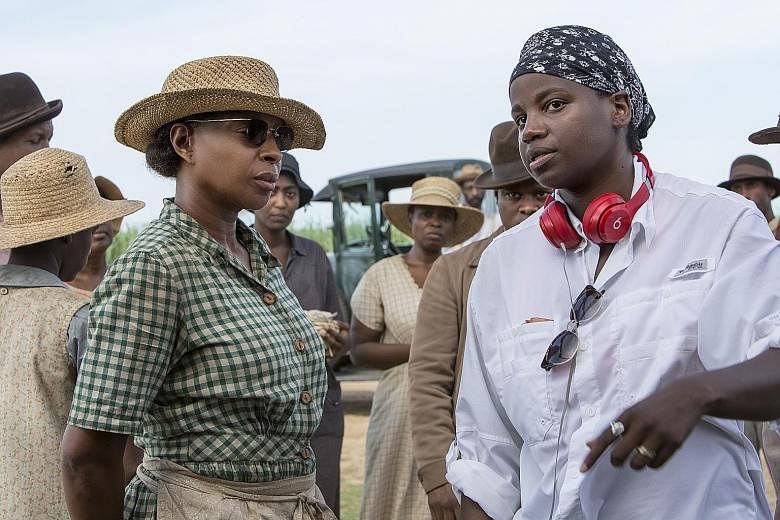One of the most talked-about films heading into awards season is Mudbound, an epic story about racism in 1940s Mississippi that critics believe is the first Netflix feature to be a real Oscar contender.
A favourite on the film festival circuit this year, it has already netted actress Mary J. Blige Golden Globe and other acting nominations for her role as Florence Jackson - the matriarch of a black farming family whose relationship with the white family that owns their land changes when their young men return from war.
Speaking at a screening of the film in Los Angeles this month, director Dee Rees and actors Blige, Garrett Hedlund and Jason Mitchell say the movie - now available on Netflix - forces Americans to look at a chapter of their history many would rather not face.
Yet Rees does not want to weave the usual victims-versus-villains narrative.
Instead, the film sheds light on how the United States was built on an "economic system based on oppression" and the notion of "whiteness as a currency".
It is an aspect of American slavery that is rarely discussed, notes the 40-year-old, who directed the Emmy-winning television biopic Bessie in 2015.
"In school, we're taught about the patriots and freedom, but we never really interrogate what those founders (of our country) did in the name of those ideals and this film invites us to interrogate our personal inheritance and how we come by this land, this labour," she says.
This continues to be relevant today "because of course we don't have the same economic growth as we did, because that was based on a model of free labour".
"And because we haven't looked at ourselves as a country, we continue to have this kind of cyclical behaviour" in race relations today, she adds.
Mitchell, who plays the Jacksons' son, says "so many people are unaware" of the racial and economic dynamics between whites and blacks during this period.
This is because when Americans learn about their racial past, "we just jump straight from slavery to civil rights and we never talked about this time that has such a hold on us as a society".
The 30-year-old Straight Outta Compton (2015) star says: "There's this level of hate in between us and we're just sweeping it under the rug because no one really wants to talk about it."
Hedlund, who plays the younger son in the white family, agrees. "Some of my family members are from a small town in Minnesota and there, our segregation was between Swedes and Norwegians, or if you were First Lutheran or Methodist," says the 33-year-old Pan (2015) actor.
"When they watched Mudbound, my cousin Tony's reaction during a lot of the hard scenes was, 'God, why do they make films like this?'
"Because they don't see it and I didn't see it as much growing up," he says of the tensions between whites and blacks depicted in the film.
" I think it's fair to say that we're kind of raised with the wool over our eyes, to a certain extent. And so it's very interesting to see that reaction from them after having to watch life in the South post World War II and everything that actually did go on there."
The story will be unsettling for many white moviegoers, but Rees believes it is vital to tell these difficult stories.
At the Sundance Film Festival early this year, she recalls being approached by "this white guy (with) tears in his eyes", who told her that after his mother died, he came across a cache of tapes where she was singing "these horrible (racist) songs and he's, like, 'I'm so ashamed - should I burn them?'"
She adds: "I said, 'No, you should keep them - the whole point is to investigate them, they're like evidence.'
"I think if that guy can look at his mother in a complicated way, he might be that much more mindful in the way he's talking to his children.
"So it's, like, don't burn the evidence - shame is useless. How do you take that feeling and make it into something that's actionable?"
Rees took an equally unvarnished approach when it came to bringing the character of Florence to life.
The director forced 46-year-old Blige - also the top-selling R&B singer behind hits such as Be Without You - to lose the make-up and false eyelashes she usually wears on stage.
Blige admits she was horrified at first. If it had been up to her, "Florence would've had a wavy wig and some lashes. I was trying to make her a cute farmer's wife," she says with a laugh.
"But Dee kept her foot down and said, 'Florence doesn't need to have anything to be beautiful.' And she really put in perspective the things I was holding on to that I deemed beautiful - you know, like lashes and stupid stuff like that."
Learning to let go of these things proved immensely rewarding in the end. "Florence really liberated me once she was born, she really helped give me a whole new confidence."
And the character has the quiet strength that many black women who lived through segregation had, Blige adds.
"I think women always hold things together and we suffer quietly because we have to.
"Both my parents were Southern, and my grandmother was this woman, so I knew her - this woman is in my DNA. So I knew how to suffer quietly, but be powerful at the same time. She was already in me."


